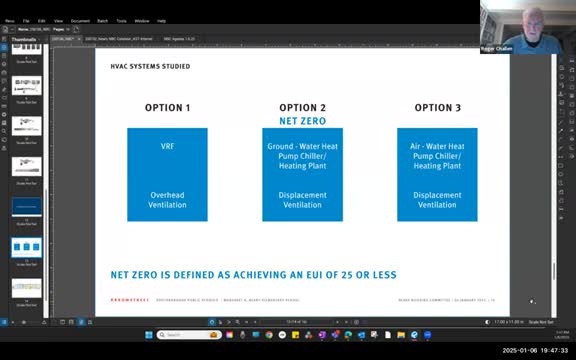Neary building committee backs ground‑source heat pump after incentives narrow lifecycle cost
Get AI-powered insights, summaries, and transcripts
Subscribe
Summary
The Neary (NHERI) Building Committee voted on Jan. 6 to direct consultants to carry a ground‑source (geothermal) heat‑pump system as the preferred HVAC option into the next round of cost estimating and schematic design.
The Neary (NHERI) Building Committee voted on Jan. 6 to direct consultants to carry a ground‑source heat‑pump system (geothermal) as the preferred HVAC option into the next round of cost estimating and schematic design.
Committee members said the ground‑source option had the strongest lifecycle‑cost case when federal and state incentives were included, but they stressed the town must present both upfront cost and incentive scenarios to voters. The committee made the decision after a detailed presentation by the project mechanical team and consultants showing capital costs, annual energy and maintenance projections, and incentive estimates.
Why it matters: committee members said the ground‑source option raises the project’s upfront construction cost relative to the lowest‑cost alternative but can become the least‑cost option when state and federal incentives are applied. That affects the total gross cost that must be presented for the town’s borrowing authorization before the state’s reimbursement is finalized.
The consultants presented three systems: a variable‑refrigerant‑flow (VRF) system (the lowest capital cost in the current estimates), a ground‑source heat‑pump system (geothermal, Option 2), and an air‑source heat‑pump approach. In the schematic‑design estimates shown to the committee, the VRF option’s construction cost was about $8.3 million for the mechanical systems package; the ground‑source option was about $11.9 million before incentives. The consultants said that after factoring current Mass Save and federal incentives (including those from the Inflation Reduction Act), the ground‑source option could reduce to an effective capital cost below the VRF option in the models presented.
The ground‑source option was also the only option in the consultants’ modeling to meet an energy‑use intensity (EUI) target of 25 or lower — a threshold that affects eligibility for some verification incentives. Consultants summarized the lifecycle analysis over a 50‑year horizon and reported that the ground‑source option showed the best total cost when the full set of incentives was included; without those incentives the ground‑source option carried a materially higher upfront cost.
Committee members and consultants discussed implementation risk and timing of incentives. Consultants said Mass Save and federal incentives are typically paid as post‑construction reimbursements (“placed in service” for federal tax‑related incentives) and therefore come after the town will have to bond the project. Committee members stressed those reimbursements and any changes in federal policy are not guaranteed and that the town will need to show voters the higher gross cost at town meeting even if some incentives are expected to arrive later.
Votes at a glance - Motion: Approve and release open‑session minutes from April 9, 2024 (AM meeting) and approve but retain executive‑session minutes from April 9, 2024. Moved by Jason; seconded by Roger. Roll‑call: Kathy — Aye; Roger — Aye; Andrew — Aye; Jason — Aye. Outcome: approved (4‑0). (Recorded earlier in the meeting.) - Motion: Direct consultants to carry the ground‑source heat pump (geothermal) system as the preferred HVAC option for schematic design and cost estimating. Moved by Jason; seconded by Roger. Roll‑call: Roger — Aye; Kathy — Aye; Andrew — Aye; Chris — Aye; Jason — Aye. Outcome: approved (5‑0).
What’s next: Arrowstreet/MEP consultants will update the schematic‑design cost estimate using Option 2 and provide a revised incentives breakdown showing (a) capital cost with no incentives, (b) capital cost with Mass Save state incentives, and (c) capital cost with both state and federal incentives. The committee asked consultants to be explicit about which incentives are post‑construction reimbursements and to show sensitivity if federal incentives change or are reduced before the project is placed in service.
Committee members said they want the finance subcommittee and full committee to see the revised numbers before materials are prepared for town meeting.
